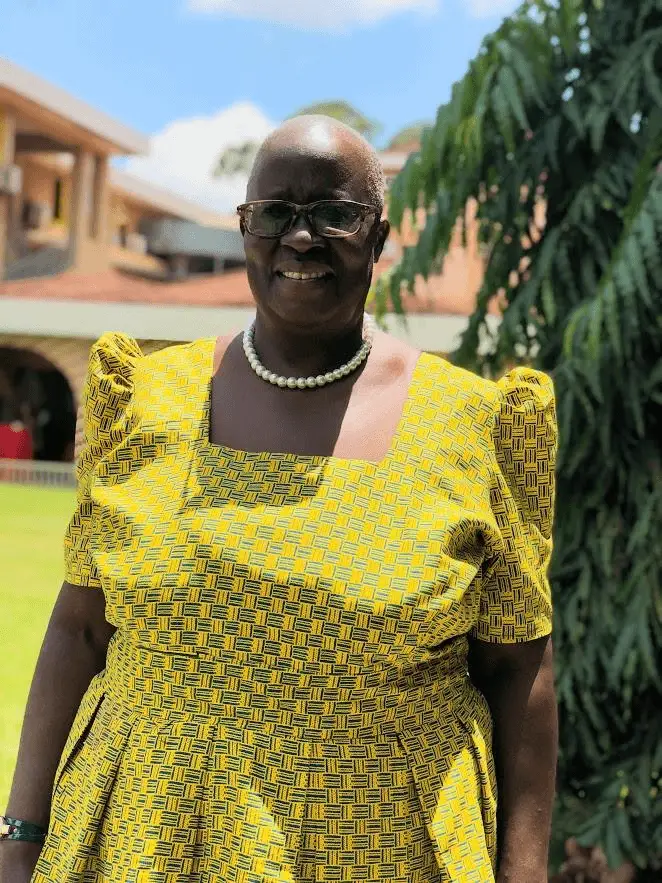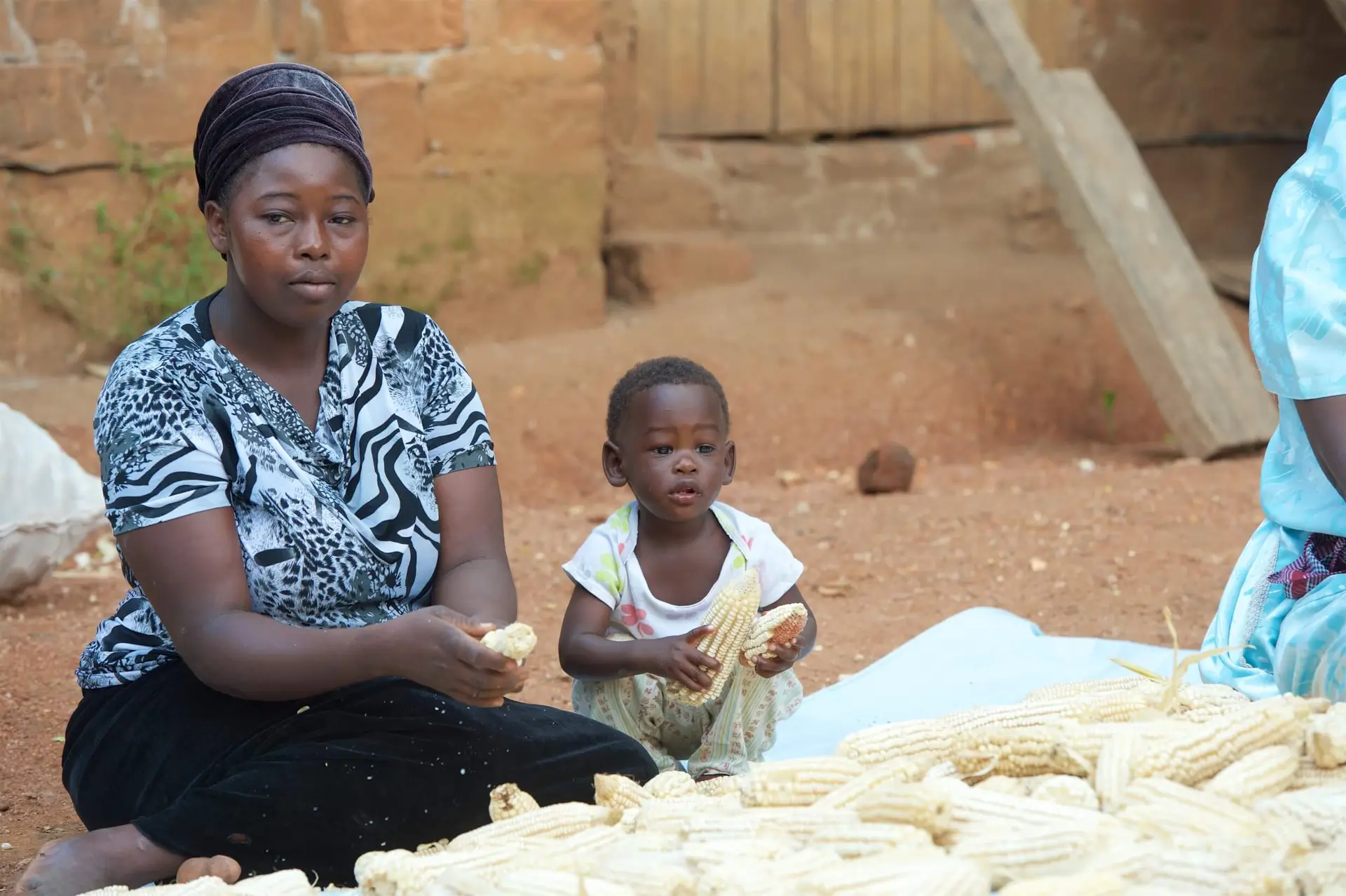In Gulu, Northern Uganda, Santa Joyce Laker leads a cooperative society of 4,070 farmers and traders, 3,000 of whom are women. Her story is an example of recovery and resilience after disaster, rising to succeed against the impact of conflict that plagued the region for almost 20 years. From rape to death of loved ones, to being displaced and facing hunger, Joyce says she saw it all, and so have many members of her cooperative. When the opportunity to do business presented itself, she run with it and co-founded Atiak Outgrowers Cooperative Society. As in many post conflict places, it is the steady hand of optimists seizing opportunities and being on the front lines that lead the way for their communities to begin recovery from the aftermath. Joyce was the optimist in Gulu.
The Atiak Outgrowers Cooperative Society collectively grows and trades sugarcane, sesame, maize, beans, rice, cotton, shea, and honey. The cooperative links members to agricultural inputs, information, agronomic education, collective financing, and markets. This has enabled farmers to double their incomes.

Santa founded the cooperative after receiving training from the Uganda Women Entrepreneurs Association Ltd (UWEAL) as part TradeMark Africa (TMA’s) Women in Trade project, funded by Government of Netherlands. Inspired by the lessons on managing businesses profitably and collective power, Santa began organising other women back home in Gulu. She convinced them that forming a cooperative will help them access bigger more lucrative urban markets directly.
TMA’s women and trade project is premised on the fact that women often face more severe impediments to trade than their male counterparts. Ranging from gender power imbalances to sextortion and cultural barriers, these constraints undermine the region’s efforts to realize its full economic potential. Often, East African women traders are less likely than men to know their rights under trade treaties and protocols, to know national product standards, border management processes, business costs, access to finance, and to form vital information and partnership networks.
From the training room to the market
Santa notes:
This cooperative is a child of TMA, birthed by UWEAL. After a series of trainings on bulk marketing, business management, and sourcing accurate information, I and the other ladies from Gulu who took part in the training decided to come together to strengthen our position and apply these lessons together. The fact that our group has grown to 3000 women in rural Uganda has amazed even ourselves – but, as the trainings showed us, there was a huge need to organise and work together as rural farmers to increase our productivity, incomes and access to markets.”
Building linkages to regional markets
Beyond the founding of the cooperative society, Santa now sells her sesame and shea in neighboring Kenya because the project bridged gaps between players in Uganda’s trade eco-system by linking women business member associations to policymakers, export service providers, and trade facilitation agencies like Uganda Revenue Authority and Uganda National Bureau of Standards). The project also supported women traders to address non-tariff barriers that have hindered their capacity to trade across the region. Access to regional markets was propelled by the success of a parallel project supported by TMA and implemented by Southern and Eastern African Trade, Information and Negotiations Institute (SEATINI). SEATINI advocated for implementation of EAC standards on maize and worked with the Uganda National Bureau of Standards (UNBS) to draft the sesame standards and lobby for adoption. Adoption of these standards have ensured that traders and farmers adhere to the same measures. It has led to doubling of sesame price from UGX 2000 (US$0.54) per kg to UGX 5350 (US$1.45) per kilo. The benefits have been far reaching exceeding the Central Uganda areas where SEATINI concentrated its work, to reach the far-flung Northern Uganda where Joyce is. Sesame is largely grown by women and although local demand is not high, the Middle East, Europe and north Africa are all potential buyers.
The project is now bearing fruit: 4772 women like Santa were trained on East Africa Community (EAC) procedures, benefits and opportunities, six business advisory hubs launched, facilitated and equipped in the districts of Kabale, Masaka, Hoima, Kapchorwa, Kampala and Amuru. Additionally, with collectives like the Atiak Outgrowers Cooperative Society formed after the training, costs for the farmers and traders have significantly reduced. Six other cooperatives like Santa’s were registered in Masaka, Kabale, Kapchorwa, Hoima and Jinja, Mpigi. Additionally, UWEAL has continued to work with the women traders to advocate for policies and practices that improve their working conditions.
Recognition
Cooperative societies like the Atiak Outgrowers Cooperative offer women a strong, knowledgeable network and, with TMA support, connects the women directly to policymakers. Members also get services including group standards certification and negotiated discounts from service providers. Santa speaks of the confidence she and the women in her cooperative have found from participating in the training:
Authorities now respect our women traders . The women now know what they’re doing, know their rights and know which office to visit depending on their needs. TMA gave us the knowledge that a cooperative society will give us more power. Now, we are receiving some support from the government because UWEAL held our hands until we could become a recognized cooperative society.”
This handholding included: Simplifying of EAC trade requirements during training sessions, a comprehensive advocacy strategy was developed and is now being implemented, studies and policy briefs highlighting the barriers to trade women face, and links to government decision-makers.
Dreaming big
Santa notes that every member of the cooperative has a minimum of three acres to grow sugarcane (the season’s focus crop). They aspire to become the largest women-led cooperative society in Uganda, growing from the current 4,070 to 15,000 by 2025.
Today, when you mention our name – Atiak – even the government knows what you are talking about. We are stronger together than when we were when working individually. I have applied all the lessons I’ve learned from UWEAL into this cooperative society. And those of us who were part of the training teach the rest. I truly thank TMA and UWEAL for all the work that went into making things possible for rural Ugandan women.”


